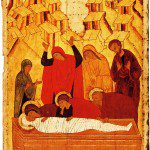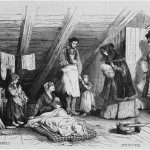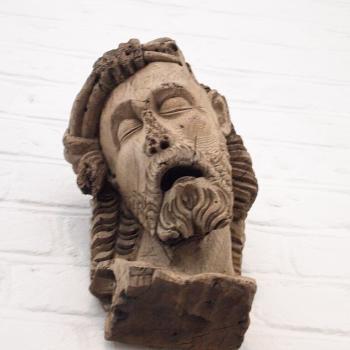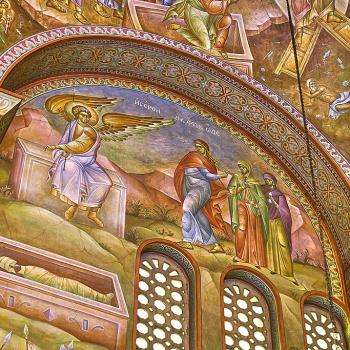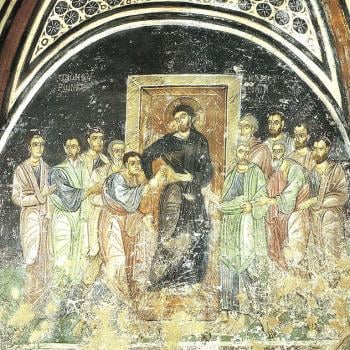![Jesus from Icon of Nikola Lipniy. By Aleksa Petrov ([1]) [Public domain], via Wikimedia Commons](https://wp-media.patheos.com/blogs/sites/637/2016/03/Jesus_from_icon_of_Nikola_Lipniy-218x300.jpg)
For as in Adam all die, so also in Christ shall all be made alive. But each in his own order: Christ the first fruits, then at his coming those who belong to Christ. Then comes the end, when he delivers the kingdom to God the Father after destroying every rule and every authority and power (1Cor. 15:22-24 RSV).
The resurrection reveals what lies beyond suffering, the glory which emerges once all our defilement, our all our sin, has been expiated. Jesus is the firstborn of the dead, and he emerges from death, bringing with him a new mode of existence which he has made available to us. All of us died in Adam, in the common unity of humanity defiled by sin. Now are able to transcend that old humanity, shed off all our sin in it, by joining ourselves with the death of Jesus so that we can rise with him and become born again, restored to the integral goodness God intended us to have. “For if we have been united with him in a death like his, we shall certainly be united with him in a resurrection like his. We know that our old self was crucified with him so that the sinful body might be destroyed, and we might no longer be enslaved to sin” (Rom. 6:5-6 RSV).
Yet, there is more. While we can find ourselves united in Jesus, and so have the defilement of our sin dispensed in and through him, we still have to find our way to the kingdom of heaven. Jesus not only took our sin and its defilement upon himself, taking on its burden, letting it expire in him, he opened the path by which we can transcend ourselves, cease our temporal existence and enter into eternal beatitude. This path, this noble and glorious path, was presented in his final work, in his ascension, where the door to heaven, which had been closed due to sin, was opened up by him. It was the final work of the incarnation, as Sergius Bulgakov explained:
If the Lord had remained on earth and had not returned to heaven, that would have signified that there is no road for the human essence to heaven, and that the One who assumed this essence would have been separated from the Holy Trinity, would have remained powerless, as it were, to deify and glorify the human essence.[2]
After Jesus established the noble path which leads to heaven, he bid us to come and follow him there. He made possible the salvation of all, but he does not force anyone to be saved. He established the path by which everyone can follow him, whether it is done implicitly by those who have no external knowledge of him, or explicitly for those who do. But he says we must come and follow him. It is our choice. The path of salvation is available to all, the work he has done is applicable to all, but its particular application must be accepted by us for it to take full effect in us.[3] He implores us to follow him, to serve him in love, because if we do, we shall go where he has gone and find our reward with and in him.[4] If we follow the path he laid down to the very end, we shall follow him to the kingdom of heaven and find ourselves face to face with God.
Thus, we see Jesus has done what we cannot do; in and through his work, he has made available the grace need in order to become perfect. Without it, we could not transcend the barrier of sin and the cycle of suffering it created for us. Now that it has been granted, we can take it unto ourselves and use it to help us follow the way Jesus set him for us. Jesus has opened the gate to heaven for us, but we must enter through that gate ourselves. But to do that, we must take the path to heaven to the very end, where we find the gate and entrance to eternal life.
The path is a path of virtue, a path of wholesome deeds made possible by grace. It is the way set up by Christ. It is the way which the earliest Christians understood represented the Christian faith. Indeed, it was so instrumental to their understanding of what it meant to be a follower of Christ that Christians first called themselves followers of the Way before later identifying themselves by the name of Christian.[5] The way Jesus set up requires us to be pure at heart, indeed, to become perfect, resembling the perfection of the heavenly Father (cf. Matt. 5:48). James, therefore, tells us we must do more than listen to the words of Jesus, but to act upon what he told us to do:
Therefore put away all filthiness and rank growth of wickedness and receive with meekness the implanted word, which is able to save your souls. But be doers of the word, and not hearers only, deceiving yourselves (James 1:21-22 RSV).
The path, which is filled with grace so that in and with every step we make further along the road to salvation, we find ourselves receiving more grace, more perfection, more of the glory of God, teaches us what we need in order to transcend the inordinate passions which would seek us to return to the cycle of sin:
For the grace of God has appeared for the salvation of all men, training us to renounce irreligion and worldly passions, and to live sober, upright, and godly lives in this world, awaiting our blessed hope, the appearing of the glory of our great God and Savior Jesus Christ, who gave himself for us to redeem us from all iniquity and to purify for himself a people of his own who are zealous for good deeds (Tit. 2:11-14 RSV).
It is the noble or royal path, the path of the great king and God, Jesus Christ, the royal highway of virtue. It is, moreover, the middle path beyond extremes, as Dorotheos of Gaza explained:
Virtue stands in the middle [between excess and defect]. This is the King’s highway of which one of the elders used to say, ‘Walk by the King’s highway and count up the miles.’ The virtues, therefore, as we say, are in the middle between too much and too little. Therefore, it is written, ‘Do not deviate to the right or to the left but walk the King’s highway.’ [6]
It is the middle path between extremes, because virtue is not extreme, but rather is the natural way of things. Turning in any direction away from the straight path of nature will turn us to one form of extreme or another, some form of excess or neglect, as Dorotheos explained by example:
Therefore, we say that virtue stands in the middle: and so courage stands in the middle between cowardice and foolhardiness; humility in the middle between arrogance and obsequiousness. Modesty is a mean between bashfulness and boldness – and so on with the other virtues. [7]
Right faith, right intention based upon that faith, right speech which follows and presents the truth of the faith and the truth in general out of a love for what is true, right action based upon what has been taught as necessary for a virtuous life, right livelihood which does not abandon justice, right effort by cooperating with grace, and right contemplation and worship of the truth, are all necessary components of this path to salvation. We must follow the path lit up by the light of the world, ever zealous in what is good and true, if we want to attain the glory of the kingdom of God.
The Didache exemplifies this by saying, “The way of light, then, is as follows. If any one desires to travel to the appointed place, he must be zealous in his works.”[8] For the works of righteousness come with right intention and knowledge, and are possible with right effort in cooperation with the grace given out by the truth, even as our contemplation and meditation of the truth will help keep us focused on the path to salvation and give us a way to overcome any temptation to divert from the straight path of virtue to the extremes of vice.
We seek, therefore, the end of the path, the cessation of temporal suffering, the cessation, indeed, of temporal existence as we join in and unite ourselves into the eternal life of God. The path set up by Jesus in his ascension to heaven is the middle path of virtue, which he tells us to follow if we are to be partakers of the divine nature for eternity. St. Clement of Alexandria beautifully tells us how the end of the path, the cessation of all that came before our union with God, will be the beginning of eternity, which nonetheless, relates to the path which we took to get there:
And the end of piety is eternal rest in God. And the beginning of eternity is our end. The right operation of piety perfects duty by works; whence, according to just reasoning, duties consist in actions, not in sayings. And Christian conduct is the operation of the rational soul in accordance with a correct judgment and aspiration after the truth, which attains its destined end through the body, the soul’s consort and ally. Virtue is a will in conformity to God and Christ in life, rightly adjusted to life everlasting. For the life of Christians, in which we are now trained, is a system of reasonable actions— that is, of those things taught by the Word— an unfailing energy which we have called faith. The system is the commandments of the Lord, which, being divine statues and spiritual counsels, have been written for ourselves, being adapted for ourselves and our neighbours.[9]
In Jesus’s earthly ministry, he taught us what we needed to know in order to follow him to salvation. What he said must be understood and interpreted in and through his resurrection and ascension, not apart from it. He told us what we need to do, but then he provided the means by which it is possible, in and through himself – we are to follow him by loving him, and doing what he told us to do, because of that love. We understand what he told us to do in and through the lens of love, and so follow through and do what he told us to do, following him all the way to the end of the of the noble path of salvation. For indeed, it is not just anywhere on the path, but at its end, we find ourselves joined with Christ, partaking of the divine nature and receiving eternal beatitude. And this is why, as St. Basil the Great explained, we must follow the road and push ourselves to follow it all the way the end: “Therefore, brethren, it is necessary and beneficial for us all to gird ourselves up like wayfarers or runners and, by ensuring our souls complete ease and lightness for this journey, to push straight on to the road’s end.” [10] For it is once we have gone to the end of the path can we find that the universal work of salvation has not only taken root in us, but has fully bloomed in us and taken us to what we should desire most of all, the glory of the kingdom of God.
[1] “He bore all these evils so that we might know every good thing; He wished cruelty to be wreaked upon Himself so that mercy might be ours; He so desired that our good that He was severe with Himself. He removed the wounds of the human race by His cross and destroyed them all in His suffering so that nothing more would ever hurt us,” St. Maximus of Turin, “Sermon 38” in The Sermons of St. Maximus of Turin. trans. Boniface Ramsey, O.P. (New York: Newman Press, 1989), 92.
[2] Sergius Bulgakov, Churchly Joy: Orthodox Devotions for the Church Year. trans. Boris Jakim (Grand Rapids, MI: William B Eerdmans Publishing Company, 2008), 122.
[3] St Thomas Aquinas explains how in and through the sacraments the grace of Christ is imparted to us individually. “Since, however (as has already been said), the death of Christ is, so to say, the universal cause of human salvation, and since a universal cause must be applied to each of its effects, it was necessary to show men remedies through which the benefit of Christ’s death could somehow be conjoined to them. It is of this sort, of course, that the sacraments of the Church are said to be,” St. Thomas Aquinas, Summa Contra Gentiles IV. trans. Charles J. O’Neil (Notre Dame: University of Notre Dame Press, 1975), 246-7 [c. 56]. Of course, the grace of the sacraments can be given in ordinary and extraordinary forms: the grace is the same grace, in either case, which is why, for example, baptism by desire is qualified as giving the grace of baptism to those who die with no fault of their own without attaining baptism but yet desiring the grace given by it.
[4] “If any one serves me, he must follow me; and where I am, there shall my servant be also; if any one serves me, the Father will honor him” (John 12:26 RSV).
[5] This early name for the Christian faith can be found in the Book of Acts: “But Saul, still breathing threats and murder against the disciples of the Lord, went to the high priest and asked him for letters to the synagogues at Damascus, so that if he found any belonging to the Way, men or women, he might bring them bound to Jerusalem” (Acts 9:1-2 RSV). It was only later, in Antioch, when Christians would be designated by the name Christian.
[6] Dorotheos of Gaza, “On Vigilance and Sobriety” in Discourses & Sayings. trans. Eric P. Wheeler (Kalamazoo, MI: Cistercian Publications, 1977), 165.
[7] Dorotheos of Gaza, “On Vigilance and Sobriety,” 166.
[8] The Epistle of Barnabas in ANF(1):148. The text then goes through a wide variety of actions which are to be followed, from loving God and doing what God loves, to avoiding all forms of impurity.
[9] St. Clement of Alexandria, “The Instructor” in ANF(2):235.
[10] St. Basil, “On Detachment” in Ascetical Works. trans. Sister Monica Wagner, C.S.C. (New York: Fathers of the Church, Inc., 1950). 489.
Stay in touch! Like A Little Bit of Nothing on Facebook:
A Little Bit of Nothing


